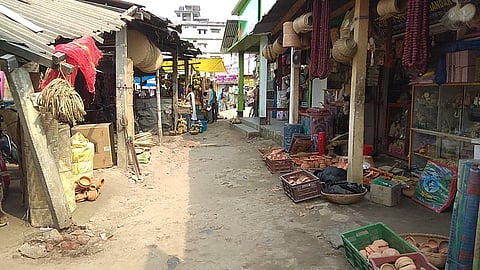
- Home
- Live Blog
- Breaking News
- Top Headlines
- Cities
- NE News
- Sentinel Media
- Sports
- Education
- Jobs

OUR CORRESPONDENT
MANGALDAI: In a stark illustration of mismanagement and external interference, the Kharupetia Primary Market Yard (PMY), a daily and weekly wholesale and retail market, stands on the brink of closure less than four months after its grand inauguration. This development raises serious questions about the efficacy of regulated market committees in Assam and the challenges faced by farmers and traders in accessing fair trading environments.
The market, overseen by the Darrang District Regulated Market Committee (DDRMC), was officially inaugurated on August 9 by Manoj Kumar Barua, Chairman of the Assam State Agricultural Marketing Board (ASAMB), in presence of local officials, alongside hundreds of farmers and traders who witnessed the launch of what was touted as a state-of-the-art facility designed to empower the agricultural community with contemporary amenities.
Constructed at an estimated cost of Rs 9 crore, the Primary Market Yard was equipped with cutting-edge infrastructure to facilitate seamless wholesale and retail transactions. It promised to alleviate longstanding issues in vegetable trading, a sector where Kharupetia has historically been a key hub, often referred to as part of Assam’s ‘vegetable bowl.’ The facility was intended to boost local economies by providing fee-free access to farmers and traders, fostering direct sales and reducing dependency on exploitative intermediaries.
Today, the once-bustling vision almost lies in ruins with only four shops remaining operational within the sprawling complex, and even them struggling to attract customers. The market’s vast potential—modern storage, sanitation, and logistics support—sits idle, symbolizing a broader failure in sustaining public investments. Shopkeepers report a near-total exodus of traders, leaving the site eerily underutilized despite its prime location and zero-fee policy.
Local vendors have levelled accusations against DDRMC officials, alleging that short-sighted policies, nepotism, and favouritism toward select groups have sabotaged the market’s viability. “We’ve invested our savings here, but threats of closure loom because of decisions that benefit a few at the expense of many,” one anonymous shopkeeper shared. Compounding these internal issues, a handful of influential middlemen are blamed for actively discouraging participation, channelling business away from the regulated space to preserve their monopolies.
A senior official of the DDRMC, acknowledged the market’s superior facilities and reiterated that no fees are levied on users—a deliberate incentive to draw crowds. However, he pinpointed two critical external factors crippling operations: two unauthorized trading hubs operating along National Highway 15, directly competing with the PMY. These unregulated spots, lacking oversight, undercut prices and draw away footfall through informal networks.
On the other hand, individuals with alleged criminal histories are reportedly resorting to hooliganism, intimidating traders and customers who opt for the government facility. This thuggery, motivated by personal profiteering, creates a climate of fear that deters legitimate business.
He emphasized that the DDRMC has formally escalated these concerns to higher authorities, urging the demolition of the illegal markets and stringent legal action against the perpetrators. Regrettably, no tangible steps have been taken to date, allowing the sabotage to persist unchecked. “The market has everything it needs to thrive, but without enforcement, it’s vulnerable to these predatory forces,” he stated.
This episode underscores systemic vulnerabilities in Assam’s regulated markets, where ambitious projects often falter due to poor post-launch support. Kharupetia, a commercial town in Darrang district, relies heavily on agriculture, with vegetable farming driving local livelihoods. Recent trends, such as plummeting produce prices (e.g., cauliflower selling for as low as Rs 2-3/kg in nearby Balugaon as of late 2024), highlight the urgent need for stable, protected trading venues. Without intervention, the PMY market’s collapse could exacerbate farmer distress, inflate consumer costs through middlemen, and erode trust in government initiatives. The Assam State Agricultural Marketing Board, which oversees such projects, has yet to issue an official response.
Also Read: Assam: Child Rights Week and World Children’s Day Celebrated in Mangaldai